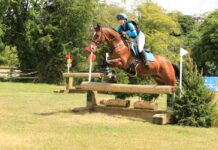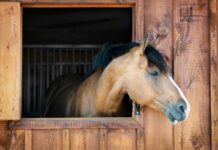Studies of performance markers in racehorses and the effects of bedding and light on horses’ sleep top prestigious contest for equine undergraduates.
The 2020 BETA Equine Thesis of the Year Award made its online début on Sunday (25 October) when it welcomed its first ever joint winners.
Victoria O’Hara, of the Royal Veterinary College, and Daniela Amiouny, of Aberystwyth University, each won a trophy and £200. They were among the four finalists who presented their theses to the judges.

Victoria’s was titled “Use of commercial ELISA for deduction of myostatin protein in equine serum and the examination of an MSTN gene promoter SINE insertion mutation in vivo”.
Myostatin is encoded by one individual gene in Thoroughbred and Quarter Horse DNA. Victoria’s study looked at the myostatin gene – which prevents muscles from overgrowing – in a series of 185 blood samples previously collected from horses in training at one racing yard.
She focused on the mutation in the gene and the effects it has on the levels of myostatin protein found.
Results showed that the horses with the mutation had some myostatin protein, although less than those without the mutation.
“There were also some horses with and without the mutation that didn’t follow this through and there was quite a lot of overlap in the myostatin concentration in blood between groups,” explained Victoria, who is now working as an equine vet.
“Finding out the cause of these outliers and the overlap might help us to discover other performance markers in racehorses and help with myostatin research in other species.”
Night light and bedding depth

Joint winner Daniela Amiouny has completed her undergraduate degree in equine and veterinary bioscience, and is now enrolled at the Canadian Academy of Osteopathy.
She joined the event from her home in Portugal to present her thesis – “The effects of night light and bedding depth on equine sleep and memory consolidation”.
Daniela’s passion for animal welfare led her to follow this subject. “I was interested to see how husbandry practices – some we don’t even think about, such as leaving the light on in the stable – can affect our horses,” she explained.
Inspired by previous research suggesting that the environment – including bedding depth and type, along with stable size - might affect horses’ sleep, Daniela’s study, set out to explore the factors affecting the duration of sleep stages and whether there was a link between sleep and cognitive performance.
Using ten university horses, four different environments were created – a control setting with lights off and 15cm of straw bedding, another with only 5cm of bedding and the lights off, a third with lights on and 15cm of bedding and the final one with lights on and 5cm of bedding.
Daniela then measured the different stages of equine sleep in each 24-hour period over six days, as well as conducting spatial memory tests.
Results showed that lower levels of bedding and lights left on significantly affect both NREM (light) and REM (deep) sleep states, and that horses lie down to sleep far more when deeper bedding is used.
Daniela found that memory function did not appear to be impaired by a reduced amount of sleep.
“This could be because the study’s periods of sleep deprivation were not enough or that the actual quality of sleep might not have been affected,” she explained to judges. “Overall, I think the study shows that there are small things that horse owners and carers can do to make a big difference to equine wellbeing.”
Challenging year for students
The two winners were selected by a judging panel, headed by research consultant Dr Georgina Crossman, with equine nutritionist Katie Williams, vet Karen Coumbe and Equestrian Trade News editor Liz Benwell.
“In a challenging year when students have often completed the final stages of their degree in testing lockdown conditions with limited access to resources, we congratulate each of the finalists on the exceptional quality of both their dissertations and presentations,” said Dr Crossman.
“They covered a diverse range of topics and we thoroughly enjoyed hearing about their studies in more detail, although it did make it incredibly tough for us to separate them!”
Claire Williams, executive director of the British Equestrian Trade Association, added: “I have never seen such a long debate among the judges. The fact that they were deliberating for a whole hour shows just how high the standard of work was and why it was necessary to take the unprecedented step of selecting joint winners. Well done to them both – and to our other two finalists, who also impressed with their extremely high standard of undergraduate study.”
The other finalists were:
Rachel Smith, of University Centre Sparsholt, with her thesis “The effect of breast support on 3D relative breast displacement and upper body muscle activity in female horse riders on an equine simulator”.
Nina Robinson, of Bishop Burton College, with her thesis “A preliminary report of the pressure present beneath bitless and bitted bridles and the effect on equine locomotion”.

















